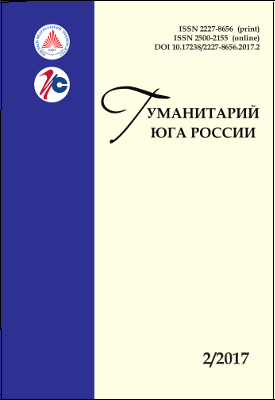Трансформация ценностей и смыслов в ситуации роста социальной энтропии в ходе социокультурных перемен в российском обществе
Для цитирования
Воробьев Г. А. Трансформация ценностей и смыслов в ситуации роста социальной энтропии в ходе социокультурных перемен в российском обществе // Гуманитарий Юга России. 2017. Том 6. № 2. С. 184-193.
Аннотация
В статье рассматривается проблематика, связанная c ценностными трансформациями в ситуации роста социальной энтропии в ходе социокультурных перемен в российском обществе. Отмечается, что рост социальных рисков закономерно приводит к снижению уровня уверенности в обществе, а трансформация ценностей и смыслов в ситуации роста социальной энтропии связана с ростом процессов отчуждения в российском обществе.
Ключевые слова:
социальная энтропия, трансформация ценностей, сложное общество, рост социальных рисков, ценности социального доверия.
Литература
Ментальные программы и модели социального поведения в российском обществе / отв. ред. А.В. Лубский. Ростов н/Д. : Фонд науки и образования, 2016. 392 с.
Храпов С.А. Социокультурные основания деструктивной динамики ценностных ориентаций общественного сознания постсоветской России // Социологический диагноз культуры российского общества второй половины XIX – начала XXI в. : материалы Всерос. науч. конф. / под ред. В.В. Козловского. СПб. : Интерсоцис, 2008.
Немировский В.Г. Российский кризис в зеркале постнеклассической социологии. М. : ЛИБРОКОМ, 2009.
Юревич А.В. Динамика психологического состояния современного российского общества // Вестник РАН. 2009. Т. 79, № 2. С. 114–116.
Нравственность современного российского общества: психологический анализ / отв. ред. А.Л. Журавлев, А.В. Юревич. М. : Ин-т психологии, 2012.
Сериков А.Е. Конечность событийных смыслов как основа модели социальной реальности // Вестник Самарской гуманитарной академии. Философия. Филология. 2006. № 1 (4). С. 126–143.
Ореховская Н.А. Эволюция массового сознания россиян. Ростов н/Д. : СКНЦ ВШ, 2011.
Зборовский Г.Е., Широкова Е.А. Социальная ностальгия: к исследованию феномена // Социологические исследования. 2001. № 8.
Гудков Л. Доверие в России: смысл, функции, структура // Новое литературное обозрение. 2012. № 117.
Реутов Е.В., Реутова М.Н. Недоверие в установках и практиках населения // Социологические исследования. 2015. № 6.
Российское общество и вызовы времени. Книга вторая / под ред. М.К. Горшкова, В.В. Петухова. М. : Весь мир, 2015.
Общество и кризис: политические риски 2016. Отчет ВЦИОМ [Электронный ресурс]. URL: https://wciom.ru/news/reports_ conferences/ (дата обращения: 18.02.2017).
Посухова О.Ю., Сериков А.В. Жизненные ориентиры жителей Южного федерального округа в контексте современных реалий // Вестник Института социологии РАН. 2016. № 16.
Комбаров В.Ю. Трансотчуждение как социологический феномен постсовременности: опыт применения теории трансгрессии // Социология и общество: глобальные вызовы и региональное развитие : материалы IV Очередного Всерос. социол. конгр. Сессия 1 : Общества и теории: отражения, отторжения, притяжения. М. : РОС, 2012. С. 90–96.
Лубский А.В., Лубский Р.А. Человек в России и на Западе: концепты дискурсивного мышления // Научная мысль Кавказа. 2012. № 4.
Храпов С.А. Социокультурные основания деструктивной динамики ценностных ориентаций общественного сознания постсоветской России // Социологический диагноз культуры российского общества второй половины XIX – начала XXI в. : материалы Всерос. науч. конф. / под ред. В.В. Козловского. СПб. : Интерсоцис, 2008.
Немировский В.Г. Российский кризис в зеркале постнеклассической социологии. М. : ЛИБРОКОМ, 2009.
Юревич А.В. Динамика психологического состояния современного российского общества // Вестник РАН. 2009. Т. 79, № 2. С. 114–116.
Нравственность современного российского общества: психологический анализ / отв. ред. А.Л. Журавлев, А.В. Юревич. М. : Ин-т психологии, 2012.
Сериков А.Е. Конечность событийных смыслов как основа модели социальной реальности // Вестник Самарской гуманитарной академии. Философия. Филология. 2006. № 1 (4). С. 126–143.
Ореховская Н.А. Эволюция массового сознания россиян. Ростов н/Д. : СКНЦ ВШ, 2011.
Зборовский Г.Е., Широкова Е.А. Социальная ностальгия: к исследованию феномена // Социологические исследования. 2001. № 8.
Гудков Л. Доверие в России: смысл, функции, структура // Новое литературное обозрение. 2012. № 117.
Реутов Е.В., Реутова М.Н. Недоверие в установках и практиках населения // Социологические исследования. 2015. № 6.
Российское общество и вызовы времени. Книга вторая / под ред. М.К. Горшкова, В.В. Петухова. М. : Весь мир, 2015.
Общество и кризис: политические риски 2016. Отчет ВЦИОМ [Электронный ресурс]. URL: https://wciom.ru/news/reports_ conferences/ (дата обращения: 18.02.2017).
Посухова О.Ю., Сериков А.В. Жизненные ориентиры жителей Южного федерального округа в контексте современных реалий // Вестник Института социологии РАН. 2016. № 16.
Комбаров В.Ю. Трансотчуждение как социологический феномен постсовременности: опыт применения теории трансгрессии // Социология и общество: глобальные вызовы и региональное развитие : материалы IV Очередного Всерос. социол. конгр. Сессия 1 : Общества и теории: отражения, отторжения, притяжения. М. : РОС, 2012. С. 90–96.
Лубский А.В., Лубский Р.А. Человек в России и на Западе: концепты дискурсивного мышления // Научная мысль Кавказа. 2012. № 4.
Форматы цитирования
Другие форматы цитирования:
APA
Воробьев, Г. А. (2017). Трансформация ценностей и смыслов в ситуации роста социальной энтропии в ходе социокультурных перемен в российском обществе. Гуманитарий Юга России, 6(2), 184-193. извлечено от https://www.jour.fnisc.ru/index.php/hsr/article/view/5097
Раздел
СОЦИАЛЬНАЯ СТРУКТУРА И СОЦИАЛЬНЫЕ ИНСТИТУТЫ В СОВРЕМЕННОМ ОБЩЕСТВЕ






